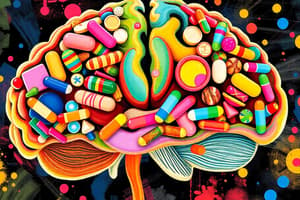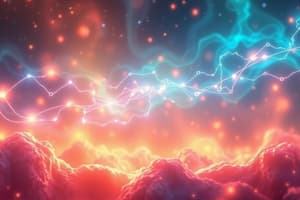Podcast
Questions and Answers
What is the primary effect of activating A1 receptors located in the radial dilator pupillae muscle of the iris?
What is the primary effect of activating A1 receptors located in the radial dilator pupillae muscle of the iris?
- Reduces fluid drainage from the eye
- Enhances lens flexibility for near vision
- Increases pupil constriction (miosis)
- Causes pupil dilation (mydriasis) (correct)
What role does acetylcholine (ACh) play in pupil constriction?
What role does acetylcholine (ACh) play in pupil constriction?
- Promotes mydriasis in response to bright light
- Inhibits ciliary muscle contraction
- Binds to M3 muscarinic receptors to facilitate muscle contraction (correct)
- Stimulates the radial muscle to contract
What is the effect of contraction of the ciliary muscle on the lens of the eye?
What is the effect of contraction of the ciliary muscle on the lens of the eye?
- Increases zonular fiber tension
- Allows the lens to bulge for better near vision (correct)
- Causes the lens to flatten for distant vision
- Lowers intralocular pressure
In sympathetic activation, which physical changes occur due to pupil dilation?
In sympathetic activation, which physical changes occur due to pupil dilation?
Which mechanism aids in fluid drainage from the eye and is important for the treatment of glaucoma?
Which mechanism aids in fluid drainage from the eye and is important for the treatment of glaucoma?
What is the effect of sympathetic nervous system activation on the bladder?
What is the effect of sympathetic nervous system activation on the bladder?
Which receptor does acetylcholine activate to promote bladder emptying?
Which receptor does acetylcholine activate to promote bladder emptying?
What role does norepinephrine play in sympathetic bladder function?
What role does norepinephrine play in sympathetic bladder function?
Which medication acts as an M3 antagonist to treat urinary frequency?
Which medication acts as an M3 antagonist to treat urinary frequency?
What is the effect of prazosin on the bladder?
What is the effect of prazosin on the bladder?
Under which circumstances would bethanechol be used?
Under which circumstances would bethanechol be used?
How does sympathetic nervous system activation affect urination during perceived threats?
How does sympathetic nervous system activation affect urination during perceived threats?
What dual action does norepinephrine have in the bladder during sympathetic activation?
What dual action does norepinephrine have in the bladder during sympathetic activation?
What effect does sympathetic activation primarily have on vascular smooth muscle in the skin and gastrointestinal tract?
What effect does sympathetic activation primarily have on vascular smooth muscle in the skin and gastrointestinal tract?
Which muscarinic receptor activation results in bronchoconstriction in the airways?
Which muscarinic receptor activation results in bronchoconstriction in the airways?
What is the primary action of cholinesterase inhibitors like neostigmine in treating myasthenia gravis?
What is the primary action of cholinesterase inhibitors like neostigmine in treating myasthenia gravis?
Which neurotransmitter's synthesis involves the enzyme tyrosine hydroxylase?
Which neurotransmitter's synthesis involves the enzyme tyrosine hydroxylase?
How does the activation of M1 and M3 receptors affect glandular secretion?
How does the activation of M1 and M3 receptors affect glandular secretion?
What mechanism does propanol, a sympatholytic drug, employ to affect the sympathetic nervous system?
What mechanism does propanol, a sympatholytic drug, employ to affect the sympathetic nervous system?
What is the role of nitric oxide (NO) in the parasympathetic activation of blood vessels?
What is the role of nitric oxide (NO) in the parasympathetic activation of blood vessels?
Which drug is an example of a sympathomimetic agent used as a decongestant?
Which drug is an example of a sympathomimetic agent used as a decongestant?
Which process is primarily influenced by cholinergic signaling through M3 receptors in the digestive system?
Which process is primarily influenced by cholinergic signaling through M3 receptors in the digestive system?
What is the main outcome of stimulation of beta-1 (B1) receptors in cardiac myocytes?
What is the main outcome of stimulation of beta-1 (B1) receptors in cardiac myocytes?
Flashcards
Parasympathetic bladder activation
Parasympathetic bladder activation
Ach activates M3 receptors in the bladder's detrusor muscle, causing contraction to empty the bladder.
Sympathetic bladder activation
Sympathetic bladder activation
SNS inhibits bladder emptying by relaxing the detrusor muscle (via β2 receptors) and constricting the sphincter (via α1 receptors), preventing urination in perceived threats.
Darifenacin
Darifenacin
An M3 receptor antagonist used to treat urinary urgency/frequency/incontinence by preventing detrusor muscle contraction.
Bethanechol
Bethanechol
Signup and view all the flashcards
Prazosin
Prazosin
Signup and view all the flashcards
Detrusor muscle
Detrusor muscle
Signup and view all the flashcards
Sphincter
Sphincter
Signup and view all the flashcards
Bladder emptying
Bladder emptying
Signup and view all the flashcards
Pupil Dilation (Mydriasis)
Pupil Dilation (Mydriasis)
Signup and view all the flashcards
Pupil Constriction (Miosis)
Pupil Constriction (Miosis)
Signup and view all the flashcards
Accommodation for Near Vision
Accommodation for Near Vision
Signup and view all the flashcards
Neurotransmitter in Pupil Dilation
Neurotransmitter in Pupil Dilation
Signup and view all the flashcards
Neurotransmitter in Pupil Constriction
Neurotransmitter in Pupil Constriction
Signup and view all the flashcards
GABAA receptor action
GABAA receptor action
Signup and view all the flashcards
Benzodiazepines
Benzodiazepines
Signup and view all the flashcards
GPCRs (G Protein-Coupled Receptors)
GPCRs (G Protein-Coupled Receptors)
Signup and view all the flashcards
Presynaptic Transmitter Uptake Blockers
Presynaptic Transmitter Uptake Blockers
Signup and view all the flashcards
Acetylcholine (ACh) Synthesis
Acetylcholine (ACh) Synthesis
Signup and view all the flashcards
Rate-limiting Step in ACh Synthesis
Rate-limiting Step in ACh Synthesis
Signup and view all the flashcards
Dopamine Synthesis
Dopamine Synthesis
Signup and view all the flashcards
Muscarinic Receptors
Muscarinic Receptors
Signup and view all the flashcards
Parasympathomimetic Drugs
Parasympathomimetic Drugs
Signup and view all the flashcards
Parasympatholytic Drugs
Parasympatholytic Drugs
Signup and view all the flashcards
Study Notes
Neuropharmacology Study Notes
- Neuropharmacology: The study of drugs that affect the nervous system.
ADRENALINE
- Secretion: A hormone released by the adrenal glands.
- Effects: Increases blood circulation, breathing, and carbohydrate metabolism.
- Function: Prepares muscles for exertion.
- Production: Produced exclusively by the medulla of the adrenal gland.
- Synthesis: Synthesized from noradrenaline.
- Chemical Composition: Contains a methyl group attached to its nitrogen.
- Receptor Activation: Activates both alpha and beta adrenergic receptors.
- Effects Summary: Increases heart rate and contractility, relaxes breathing tubes, increases blood pressure via vasoconstriction, and increases blood sugar levels.
NORADRENALINE
- Secretion: A hormone released by the adrenal medulla and sympathetic nerves.
- Function: Neurotransmitter and drug.
- Function as a drug: To raise blood pressure.
- Production: Produced by the medulla of the adrenal gland and the sympathetic nervous system.
- Synthesis: Synthesized from dopamine.
- Chemical Composition: Contains hydrogens attached to nitrogen.
- Receptor Activation: Activates alpha adrenergic receptors.
- Main Effect: Increasing blood pressure via vasoconstriction.
Synaptic Transmission
- Step 1: Action potential invades the presynaptic terminal.
- Step 2: Voltage-gated Ca²⁺ channels open and Ca²⁺ enters.
- Step 3: Synaptic vesicles move to the presynaptic membrane and fuse with it.
- Step 4: Neurotransmitter diffuses across the synaptic cleft.
- Step 5: Neurotransmitter binds to postsynaptic receptors.
- Step 6: Voltage-gated Na⁺ channels may be activated.
- GPCRs: Ligand-gated ion channels.
- Comment: This process is similar across many different types of neurons.
Neuronal Diversity - Neurotransmitter production and storage
- GABAergic Neuron (inhibitory):
- Synthesis: Glutamate decarboxylase.
- Transporter: GABA transporter.
- Noradrenergic Neuron (modulatory):
- Synthesis: Tyrosine hydroxylase, dopamine beta-hydroxylase.
- Transporter: Vesicular monoamine transporter.
- Transporter: Presynaptic catecholaminergic transporter (NET).
Neuronal Diversity - Postsynaptic responses
- Fast ionotropic actions: glutamate, GABA, acetylcholine, monoamines (most)
- Slow metabotropic actions: Ion channels, GPCRs, enzymes.
- Ionotropism: Muscle contraction.
- Dromotropism: Rate of conductance via AV node.
Drug Targets
- Voltage-gated Na⁺ channels: Blockers stop electrical transmission, local anesthetics and epilepsy treatment, experimental drug like tetrodotoxin.
- Voltage-gated Ca²⁺ channels: Blockers inhibit transmitter release.
Other Notes
- Exocytosis: Blocker inhibits transmitter release (e.g. Botulinum toxin A).
- Transmitter synthesis: Precursor of transmitter (e.g. dopamine) stimulates production.
- Vesicular storage: Blockers of vesicular transporter lead to empty vesicles.
- Presynaptic transmitter uptake: Blockers prolong transmitter actions (e.g. treatment of depression).
- Nicotinic AChRs: Pentameric structure. ACh binding sites, ionotropic receptors. Gq and Gi/o protein-coupled receptors.
- Drugs and the ANS: Parasympathomimetic, parasympatholytic, sympathomimetic, sympathetic.
- Heart, Parasympathetic activation: ACh activates M2 muscarinic receptors. Decrease in heart rate (negative chronotropic effect).
- Heart, Clinical applications: Atropine (non-selective muscarinic antagonist), Noradrenaline and adrenaline.
- Vasculature: Glyceryl trinitrate (GTN), Nitroglycerin.
- Airways: Parasympathetic activation, Sympathetic activation.
- Salbutamol/Salmeterol: B2-selective agonist, anti-asthmatic.
- Parasympathetic activation of digestive system: ACh activates M3 receptors.
- Clinical applications – ANS control of digestion: Pilocarpine, Bethanechol, Atropine, hyoscine. Pirenzepine
- Clinical applications – ANS control of bladder: Bethanechol, Darifenacin, Prazosin.
- Eye – pupil: Sympathetic activation.
- Clinical applications – ANS control of the pupil: Atropine, Tropicamide
- Clinical applications – ANS control of the eye: Carbachol, Pilocarpine, Atropine, Tropicamide, Timolol
- Indirectly acting parasympathomimetics: Clinical relevance of anticholinesterases.
- Indirectly acting sympatholytics: NA synthesis.
- Clinical applications of indirectly acting parasympatholysis: Botulinum toxin A.
- Tyramine: The 'cheese reaction', Amine contained in fermented foods, can act as sympathomimetic in patients on MAOIs.
- ADHD: Methylphenidate, common side effects, mechanism of action.
Studying That Suits You
Use AI to generate personalized quizzes and flashcards to suit your learning preferences.




